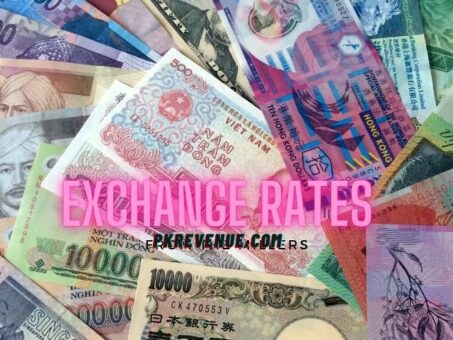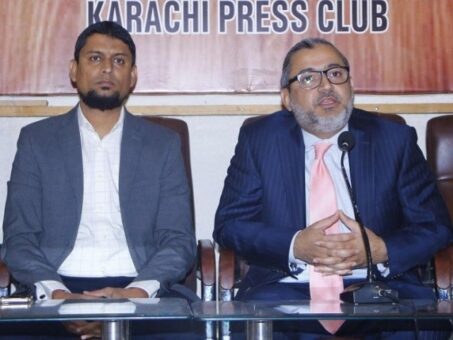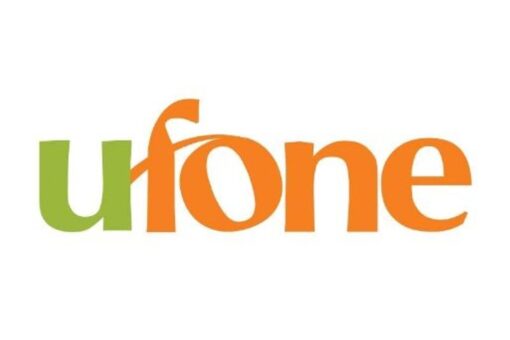A consignment of four cargo trucks from Uzbekistan arrived at the Torkham border, marking the commencement of trade between Uzbekistan and Pakistan.
(more…)Author: Hamza Shahnawaz
-

Pakistan’s open market exchange rates on November 04
KARACHI: Following are the open market exchange rates of foreign currencies in Pak Rupee (PKR) in Pakistan on November 04, 2021 (The rates are updated at 10:30 AM Pakistan Standard Time):
Currency Buying Selling Australian Dollar (AUD) 124.50 126.00 Bahrain Dinar (BHD) 386.75 388.50 Canadian Dollar (BHD) 135.00 136.50 China Yuan (BHD) 23.75 23.90 Danish Krone (DNK) 23.45 23.75 Euro (EUR) 195.50 197.50 Hong Kong Dollar (HKD) 16.70 16.95 Indian Rupee (INR) 2.03 2.10 Japanese Yen (JPY) 1.41 1.44 Kuwaiti Dinar (KWD) 481.70 484.20 Malaysian Ringgit (MYR) 36.45 36.80 NewZealand $ (NZD) 96.45 97.15 Norwegians Krone (NOK) 17.50 17.75 Omani Riyal (OMR) 392.70 394.70 Qatari Riyal (QAR) 39.90 40.50 Saudi Riyal (SAR) 44.85 45.50 Singapore Dollar (SGD) 124.50 126.00 Swedish Korona (SEK) 18.50 18.75 Swiss Franc (CHF) 159.90 160.80 Thai Bhat (THB) 4.80 4.90 U.A.E Dirham (AED) 47.20 47.70 UK Pound Sterling (GBP) 230.00 232.50 US Dollar (USD) 169.50 171.00 Disclaimer: Team PKRevenue.com provides the available rates of the open market, which are subject to change every hour. Team PKRevenue.com provides the available exchange rates at the time of posting the story. So the team is not responsible for any inaccuracy of the data.
-

Food inflation not linked to urea prices
KARACHI: The fertilizer industry is playing a critical role in ensuring food security and managing food inflation in Pakistan through adequate and affordable supply of urea at one fifth the international prices.
In a media briefing on Wednesday, Imran Ahmed, CFO of Engro Fertilizers, highlighted that food inflation is one of the biggest challenges being confronted by the Government. However, food inflation is not unique to Pakistan as global food prices have jumped by 34 percent between July 2020 and June 2021, owing to a surge in oil prices, supply chain disruptions and unfavorable weather conditions. Reports suggest that globally the food prices have soared to its highest point in a decade and that has translated locally, where the prices have even been adversely impacted by rupee devaluation on top of global price increases.
He stressed that urea prices do not have any impact on food inflation as only 2.6 per cent of farmers wallet is spent on urea. According to calculations, every Rs 50/bag increase in urea price has an impact of only 1 paisa on the price of a ‘roti’. The impact of a Rs 50/bag increase in urea price on other agri commodities like rice, sugar, maize, potato, tomato and banana is all within 10 paisas per KG.
The local fertilizer industry has shielded farmers from a steep rise in international urea prices as domestically produced urea is currently priced at 2012 level. Urea is available in Pakistan at a significant discount of 81 percent, equivalent to Rs 7500/bag, compared to the international rates. As a result, farmers are getting an annualized benefit in excess of Rs 350 billion and the country is expected to save $3 billion in import substitution during 2021.
He commended the PTI Government for its vision to transform the agriculture sector of Pakistan and supportive policies that enabled the fertilizer sector to reduce urea prices by Rs 400/bag last year. Imran declared that in the absence of a strong local fertilizer industry, Pakistan would have faced at best massive urea shortages like India where landed urea imports are costing as much as $1000 / ton, or even more dire an all-out food emergency as currently being experienced in Sri Lanka.
Imran pointed out that the real issue being faced by the local farmers is the global hike in DAP prices by over 100 per cent that has reflected locally as well as majority of DAP demand is met through imports. To promote balanced mix of fertilizers for higher crop productivity, the Government must urgently provide the farmers relief by implementing the much-promised DAP subsidy. Currently, the subsidy on DAP is being extended only by the Government of Punjab. The Federal Government should convince and mobilize other provincial governments to immediately allocate funding for phosphatic fertilizer subsid for Rabi 2021-22.
It has been widely recommended by the farming community that the Government should increase the subsidy amount to Rs 2,000/bag in view of the current prices of DAP. Further, the subsidy should not be restricted to number of bags, but instead be based on land holding and recommended dose for the farmers.
For the now commenced Rabi season, the Government has very prudently agreed to proceed with disbursement of the subsidy through the usual method of stickers/vouchers. The Government is to be recognized for its adaptability realizing that given the longer than expected duration for the complete roll out of the Kissan Card system, the proven voucher process should be continued for providing timely relief to farmers. The multi-featured Kissan Card is expected to be fully implemented and scaled up by the next season.
-

Ufone signs Rs21 billion agreement for 4G spectrum
ISLAMABAD: Pakistani Telecom Company, Ufone has secured its largest syndicated financing facility jointly led by MCB Bank Limited (MCB) (Agent bank), Allied Bank Limited (ABL), Bank of Punjab (BoP), National Bank of Pakistan (NBP), and United Bank Limited (UBL) to fund the acquisition and rollout of its 4G services across Pakistan.
President and Group CEO, PTCL & Ufone, HatemBamatraf signed the agreement for the syndicated financing of PKR 21 billion at a ceremony held in Islamabad, which was also attended by President, MCB Bank, Imran Maqbool; Group Head, Corporate Finance & International Banking, MCB Bank, Mr. ShoaibMumtaz; President Allied Bank, AizidRazzaq Gill; Chief, Corporate & Investment Banking, Allied Bank, OwaisShahid; Head Investment Banking, Bank of Punjab, Umer Khan, AbidKitchlew Divisional Head C&IBG, National Bank, and Farooq Ahmed Khan Group Head Corporate & Investment Banking, United Bank Ltd .
Ufone has recently been awarded 4G Spectrum License as a result of competitive bidding during the spectrum auction held by the Pakistan Telecommunication Authority (PTA). The company’s investment in 4G spectrum will go onto enhancing its network capacity and readiness besides delivering superior connectivity and user experience to its customers.
Speaking at the ceremony President and Group CEO, PTCL & Ufone, HatemBamatraf expressed his gratitude to the banking consortium for the timely financial support and said “The Financing Solution will go a long way in bringing high quality mobile broadband services to the people of Pakistan. It will improve quality of network services and usher in a host of socio-economic opportunities for growth and development for our customers” He further added “ It is a mutual goal that both Pakistan’s banking and telecom industries are working to achieve in order to create shared value for the communities we serve.”
-

Stocks end down 80 points in range bound trading
KARACHI: The stocks have ended down by 80 points on Wednesday in a range bound trading activity.
The benchmark KSE-100 index of Pakistan Stock Exchange (PSX) closed at 47,032 points as against 47,113 points showing an decrease of 80 points.
Analysts at Arif Habib Limited said that the market remained range-bound today due to concerns over monetary tightening and resuming of foreign selling spree.
Technology sector remained in the limelight throughout the day as traders placed the bet on high-beta stocks to mark quick trading gains. On the flip-side, Institutional investors fetched for value hunting as buying was observed in E&P and banking stocks.
In the last trading hour, investors opted for profit booking specially in cement and steel stocks in expectation of interest rate hike by SBP in the upcoming monetary policy.
Sectors contributing to the performance include Technology (+193 points), Refinery (+22 points), Chemical (+19 points), Leather (+12) and Insurance (+7 points).
Volumes increased from 307 million shares to 381 million shares (+24.2 per cent DoD). Average traded value also increased by 12.7 per cent to reach US$ 91.5 million as against US$ 81.08 million.
Stocks that contributed significantly to the volumes include PTC, HASCOL, WTL, TRG and TPLP.
-

SBP selects eight banks for collateral-free loan scheme
KARACHI: State Bank of Pakistan (SBP) has selected eight banks for lending collateral-free loan to Small and Medium Enterprises (SMEs), a statement said on Wednesday.
Governor State Bank of Pakistan, Dr. Reza Baqir announced that banks have shown overwhelming response to an innovative financing scheme for collateral free lending to SMEs introduced by the State Bank and supported by the Government of Pakistan.
This is the first time a comprehensive collateral free SME lending scheme has been introduced by SBP in the country.
Out of 20 banks that competed for participating in this scheme, 8 banks under four categories have been selected on the basis of highest amount of finance and highest number of SME clients to be served.
These categories include large banks, mid-sized banks, small banks, and banks in collaboration with fintechs.
The winning banks are Habib Bank Ltd, United Bank Ltd, Allied Bank Ltd, Meezan Bank Ltd, Bank Alfalah Ltd, The Bank of Punjab, JS Bank Ltd and The Bank of Khyber. These banks have been selected through a transparent bidding process based on prescribed criteria.
While appreciating banks’ enthusiastic response, Dr. Reza Baqir, Governor State Bank emphasized early roll out of the scheme by banks.
He also underscored the importance of extensive awareness and marketing of the scheme for the SMEs to fully utilize its benefits.
Access to finance for SMEs remains low in Pakistan due to a number of factors including lack of collateral and perceived high risk due to non-availability of track-record.
To address these issues, SBP adopted an innovative approach by designing SME Assan Finance, commonly known as SAAF which refers to the collateral free nature of finance. SAAF has been developed after thorough consultation with stakeholders.
To implement this scheme, the SBP decided that rather than advising all banks to offer this product, only willing banks will be encouraged to be part of this initiative and develop their expertise through a transparent process.
SAAF was launched in August 2021 and bids were solicited from the interested banks. Under SAAF, SBP will provide refinance to the banks at 1 per cent per annum (p.a.) for onward lending to SMEs at a maximum end-user rate of up to 9 per cent p.a.
The end user rate under SAAF would be attractive for SMEs when compared with usual cost of financing for them from informal sources which can run 25 per cent – 50 per cent p.a.
The margin available to banks will help them to make an upfront investment in human resources, technology and processes to cater to promote SME finance.
This incentive has been provided to banks for the first three years of this scheme after which it is expected to become self-sustaining.
Additionally, under SAAF, risk coverage of up to 60 percent is being provided by Government of Pakistan. Under the SAAF scheme, SMEs can avail collateral free financing of up to Rs 10 million to meet their long-term capital expenditure and short-term working capital needs.
Governor Baqir also emphasized that a Shariah compliant version of SAAF is also available.
SBP has allocated refinance limits to eight winning banks for three years. Currently, these banks are finalizing their roll out plans for successful implementation of the scheme.
It is expected that selected banks will shortly roll out their SAAF programs through public announcements and marketing campaigns so that SME borrowers can approach any of these eight banks to request collateral free financing.
-

Issuance of debit, credit notes for tax adjustment
Section 9 of the Sales Tax Act, 1990 provides a framework for the issuance of debit and credit notes by registered persons.
(more…) -

Provision for input tax adjustment
Section 8B of Sales Tax Act, 1990 has defined provision for input tax adjustment.
The Federal Board of Revenue (FBR) issued the Sales Tax Act, 1990 updated up to June 30, 2021. The Act incorporated amendments brought through Finance Act, 2021.
Following is the text of section 8B of Sales Tax Act, 1990:
8B. Adjustable input tax.– (1) Notwithstanding anything contained in this Act, in relation to a tax period, a registered person other than public limited companies listed on Pakistan Stock Exchange shall not be allowed to adjust input tax in excess of ninety per cent of the output tax for that tax period:
Provided that the restriction on the adjustment of input tax in excess of ninety percent of the output tax, shall not apply in case of fixed assets or Capital goods:
Provided further that the Board may by notification in the official Gazette, exclude any person or class of persons from the purview of sub-section (1).
(2) A registered person, subject to sub-section (1), may be allowed adjustment or refund] of input tax not allowed under sub-section (1) subject to the following conditions, namely:–
(i) in the case of registered persons, whose accounts are subject to audit under the Companies Ordinance, 1984, upon furnishing a statement along with annual audited accounts, duly certified by the auditors, showing value additions less than the limit prescribed under sub-section (1) above; or
(ii) in case of other registered persons, subject to the conditions and restrictions as may be specified by the Board by notification in the official Gazette.
(3) The adjustment or refund of input tax mentioned in sub-sections (2), if any, shall be made on yearly basis in the second month following the end of the financial year of the registered person.
(4) Notwithstanding anything contained in sub-sections (1) and (2), the Board may, by notification in the official Gazette, prescribe any other limit of input tax adjustment for any person or class of persons.
(4A) Notwithstanding anything contained in sub-sections (1), (2) and (3), input tax allowed in case of locally manufactured electric vehicles subject to reduced rate of tax under the Eighth Schedule shall be limited to the extent of amount of output tax and no refund or carry forward of excess input tax shall be allowed.
(5) Any auditor found guilty of misconduct in furnishing the certificate mentioned in sub-section (2) shall be referred to the Council for disciplinary action under section 20D of Chartered Accountants, Ordinance, 1961 (X of 1961).
(6) In case a Tier-1 retailer does not integrate his retail outlet in the manner as prescribed under sub-section (9A) of section 3, during a tax period or part thereof, the adjustable input tax for whole of that tax period shall be reduced by 60%.
(Disclaimer: The text of above section is only for information. Team PkRevenue.com makes all efforts to provide the correct version of the text. However, the team PkRevenue.com is not responsible for any error or omission.)
-

Joint, several liability in tax default
Section 8A of Sales Tax Act, 1990 has explained joint and several liability of registered persons in supply chain where tax unpaid.
The Federal Board of Revenue (FBR) issued the Sales Tax Act, 1990 updated up to June 30, 2021. The Act incorporated amendments brought through Finance Act, 2021.
Following is the text of section 8A of Sales Tax Act, 1990:
8A. Joint and several liability of registered persons in supply chain where tax unpaid.– Where a registered person receiving a taxable supply from another registered person is in the knowledge or has reasonable grounds to suspect that some or all of the tax payable in respect of that supply or any previous or subsequent supply of the goods supplied would go unpaid, of which the burden to prove shall be on the department such person as well as the person making the taxable supply shall be jointly and severally liable for payment of such unpaid amount of tax:
Provided that the Board may by notification in the official gazette, exempt any transaction or transactions from the provisions of this section.
(Disclaimer: The text of above section is only for information. Team PkRevenue.com makes all efforts to provide the correct version of the text. However, the team PkRevenue.com is not responsible for any error or omission.)
-

Pakistan’s open market exchange rates on November 03
KARACHI: Following are the open market exchange rates of foreign currencies in Pak Rupee (PKR) in Pakistan on November 03, 2021 (The rates are updated at 09:02 AM Pakistan Standard Time):
Currency Buying Selling Australian Dollar (AUD) 126 127.5 Bahrain Dinar (BHD) 386.75 388.50 Canadian Dollar (BHD) 136 137.50 China Yuan (BHD) 23.75 23.90 Danish Krone (DNK) 23.45 23.75 Euro (EUR) 195 197 Hong Kong Dollar (HKD) 16.70 16.95 Indian Rupee (INR) 2.03 2.10 Japanese Yen (JPY) 1.41 1.44 Kuwaiti Dinar (KWD) 481.70 484.20 Malaysian Ringgit (MYR) 36.45 36.80 NewZealand $ (NZD) 96.45 97.15 Norwegians Krone (NOK) 17.50 17.75 Omani Riyal (OMR) 392.70 394.70 Qatari Riyal (QAR) 39.90 40.50 Saudi Riyal (SAR) 44.50 45 Singapore Dollar (SGD) 124.50 126 Swedish Korona (SEK) 18.50 18.75 Swiss Franc (CHF) 159.90 160.80 Thai Bhat (THB) 4.80 4.90 U.A.E Dirham (AED) 47 47.50 UK Pound Sterling (GBP) 231.50 234 US Dollar (USD) 169.70 171.20 Disclaimer: Team PKRevenue.com provides the available rates of the open market, which are subject to change every hour. Team PKRevenue.com provides the available exchange rates at the time of posting the story. So the team is not responsible for any inaccuracy of the data.
